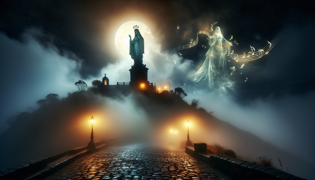Introduction
I first heard the song on a wind-swept evening, when the clouds hung low and gray over Quito like an old shawl draping the city in hush. The air tasted of eucalyptus and distant rain, cool against my tongue, while streetlamps flickered like tired fireflies lining El Panecillo’s winding path. I was guiding a small group of travelers up the slope, recounting colonial tales of gold and blood, when an accordion’s lonely refrain drifted past us. It curled through the pines like smoke, bittersweet as the aroma of freshly baked empanadas wafting from a nearby street cart. ¡De ley! one guest whispered, clutching her shawl tighter, convinced we’d stumbled into a guerrilla of pranksters.
Each note lay heavy in the air, an echo older than the granite steps beneath our boots. Shadows trembled at the edge of my vision—shapes half-seen, as if stone carvings had come to life. The faint scent of tobacco smoke drifted on the breeze, sharp and intoxicating, mingling with the floral sweetness of azucenas from an unseen garden. I felt the river of history churn in my veins, drawing me forward in spite of every rational thought. As a child, my abuela used to hum ancient tonadas by candlelight, her voice soft yet unwavering. I recognized that melody, though centuries had frayed its edges like worn lace.
Above us, the Virgen del Panecillo stood sentinel, her wings a silent chorus carved from stone. The statue’s gaze—aloof and yet almost tender—seemed to drink in the music, as if she too remembered every prayer, every lament, every secret whispered at her feet. I paused, breath catching like a bird in my chest, and watched the mist swirl at her base. That’s when I saw her: a figure draped in colonial-black mantilla, gliding along the plaza’s perimeter. Her face was pale moonlight, features too delicate for this world, lips parted as the accordion sighed its next phrase. My heart thundered—sound and sight converged in a single moment of wonder, as though a candle flame danced between two worlds.
I stepped forward, gravel crunching beneath my soles, and the song wavered. The wind dropped to a hush, carrying the taste of the night—cold stone, damp earth, and something vegetal I could not name. She paused, head tilted toward the sky, eyes closed, and a single tear of dew glinted on her cheek like a pearl. My skin prickled with the friction of anticipation and fear, a sudden chill that crawled beneath my collar. The accordion’s voice resumed, richer now, layered with the echo of a vocal harmony that felt woven from moonbeams and long-forgotten prayers.
A dove cooed from the statue’s shoulder, its feathers ruffling in sync with the music’s rise and fall. I lifted my hand to silence the tremor in my voice. “Who are you?” I whispered into the lamplight. The specter tilted her head, and the melody answered—no words, yet a story that unfolded like fine embroidery: a tale of a soldier’s farewell, a forbidden tryst in candlelit halls, a promise lost among the cobblestones of old Quito. The night air throbbed with that melody’s pulse, each note a footstep on a path that wound through centuries.
I felt time unravel in my hands, threads of past and present braided together by her refrain. The stone beneath me seemed to sigh, carrying echoes of footsteps long silenced. In that moment, I knew I had crossed a threshold: the ordinary world dissolved on the wind, leaving only the song and the woman who sang it. Her eyes opened—dark pools reflecting lamplight—and for a heartbeat, I saw the edge of both worlds. Then she vanished, the melody trailing off like a sigh in the breeze, and the river of history flowed on. My guests gathered around, faces pale, breaths misting in the cold glow of the lamps. I stood alone a moment longer, the final notes echoing in my chest, and understood that some stories live not in books but in the songs that haunt the night.
A Nocturnal Invitation
That night, curiosity lured me back up the slope before the sun had fully dipped below the Andes. The air carried a brittle chill, as though the mountains themselves exhaled old secrets. I wore my grandmother’s shawl, its wool still scented of lavender oil, and carried a small lantern whose flame trembled with each gust. At the plaza’s edge, the accordion rested against the stone pedestal—no specter in sight, only the gentle hum of the city far below. The instruments’ leather bellows sagged, and the metal reeds lay cold and silent, as if waiting for a hand to coax them back to life.
I leaned in, listening for even the faintest breath of melody. A cat slunk from the shadows, its fur bristling like a fine porcelain brush, then vanished into the night. I pressed my ear to the stone, feeling its heartbeat in tiny vibrations under my palm. The plaza was empty save for the rondón of streetlamps—gold pools of light that stood guard over rolling shadows. The scent of roast guinea pig drifted up from a distant stall, earthy and pungent, mingling with the faint sweetness of maracuya blossoms buried in a garden below.
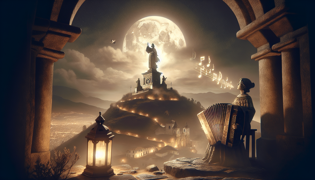
A single note bloomed out of silence, sharp as a pearl bursting on rock. My spine prickled; the note hung in the air like a prayer bead, then unfurled into a haunting waltz. It called to me, soft yet insistent, weaving a melody that stroked memory’s skin. The air shivered; the lamplight flickered; and the trumpet tone of distant church bells chimed a counterpoint. I inhaled deeply—the scent of damp flagstone rising with the wind—and stepped toward the accordion.
The melody shifted to a minor key, voices rising like a choir of ghosts gathered in twilight. I could almost taste the metallic tang of a sword drawn in a convent corridor, the echo of secret kisses traded in cloistered halls. My fingertips itched to touch the bellows, to feel the accordion’s tremor beneath my palm. The specter appeared then, drifting like a linen sheet caught on a breeze, her eyes alight with invitation. She extended a hand, pale and insubstantial, and the waltz slowed to a heartbeat.
Fear and wonder tangled in my chest. I swallowed an anxious gulp, the air tasting of moss and church incense. “Why do you sing?” I asked. My voice cracked like an old guitar string. She answered with a flourish of chords, the notes painting pictures of colonial ballrooms and candlelit corridors. With each turn of the bellows, a new phrase unfolded, more sorrowful than the last, as if the song carried a lifetime of farewells.
I stepped forward, lantern held high, and the light revealed the specter’s features: cheeks hollowed by time’s slow drift, eyes reflecting centuries of longing. The breeze carried the sound down into the city, where lovers paused mid-kiss and street dogs tilted their heads in unison. I joined my voice to the melody, a whispered harmony that rose and trembled in the humid air. Under the Virgin’s watchful gaze, the waltz enveloped us, a bridge of sound spanning life and death, binding my fate to hers with every note.
Melodies from the Past
I spent the next evening at the Archivo Arzobispal, poring over dusty tomes and brittle letters by lamplight. The pages crackled under my fingertips, each word a footprint in history’s dust. I traced faded entries that spoke of a musician named Isabel de la Torre, who rose each night to serenade the city from atop the hill, her voice a balm for wounded souls. The ink reeked of tannin and age, and my nostrils flared at the tang of nicotine and spilled wine that stained the margins. A careful annotation described her final performance: a farewell concert before departing for Spain, a promise never fulfilled.
By the time I closed the ledger, my eyes stung with the musty heat of the archives and the weight of a story unfinished. The corridors smelled of cedar paneling and wax-polished floors, a contrast to the humid stones outside. I cradled an oil lamp and tiptoed past towering shelves, each book a silent witness to centuries of confession and sin. When I emerged into Quito’s cobblestone streets, dusk had settled like velvet, and the city lights shimmered through a haze of exhaust and jasmine.
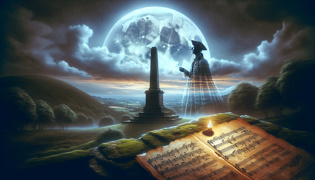
That night, I carried the old score of De la Torre’s final aria up the hill, its notes scrawled awkwardly in faded ink. The moon was a bruised orb overhead, and the Virgin’s silhouette loomed like a guardian carved from starlight. I placed the music on the pedestal and waited, heart thundering with anticipation. The breeze whispered through pine needles, carrying the aroma of roasting corn and distant rum.
A solitary note sounded, timid at first, then blossoming into the melody I’d carried in my mind. The specter materialized, gliding toward the sheet music as though drawn by magnetism. She lifted a hand and brushed away the loose pages, her touch stirring dust motes that glowed like embers in the lantern’s halo. The accordion’s voice joined hers, weaving around the melody in counterpoint, rich as cocoa warmed with cinnamon.
As the harmonies intertwined, I recognized the tune—a lullaby my mother once hummed when I was small, soft and protective. My chest fluttered with a mixture of fear and nostalgia, tears prickling at my eyes. The wind carried the song down the slope and into the city, where street vendors paused mid-call and taxi horns hushed in reverence. I closed my eyes and let the music wash over me like a tide, salty and sweet.
When the final chord faded, the specter bowed her head, an echo of gratitude passing between us. The air smelled of wet stone and cherry blossoms drifting from a hidden garden. I gathered the scattered sheets and tucked them into my coat, the parchment crackling beneath my fingers. As I descended toward the city lights, I felt a new rhythm in my step—one that carried the pulse of centuries in its beat.
The Virgin’s Vigil
Legends say the Virgin statue atop El Panecillo never sleeps; her eyes follow every footstep, her wings shelter the faithful. I tested that claim one dawn, arriving before first light, the sky a pale bruise of lavender and peach. The air was chilled, tasting of snowmelt from distant peaks and the faintest hint of coffee roasting in a café below. Dew clung to my boots in tiny beads, each drop reflecting the pastel glow of the awakening sky. The plaza lay empty, save for the whisper of pigeons stirring among the ribbons of prayer left at the statue’s feet.
I approached the pedestal, a thin tremor of anticipation coursing through me. Wrapped in my grandmother’s shawl, I knelt to light a candle in the offering bowl. The wax hissed as the flame bridged shadow and light, scattering gold across the granite surface. I paused to inhale the mingled scents of melted tallow and fresh basil tucked behind the statue’s base—a fragrance at once sacred and earthly.
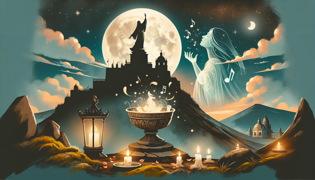
At first, there was only silence, broken by the distant crow of a rooster and the murmur of an early market. Then came a single note, clear and crystalline, drifting down from the heavens above her head. The specter sang to the Virgin as though offering her a gift: a prayer folded into melody. The wind carried the tune through the city’s stones, stirring shutters and tousling laundry hung between balconies. I wrapped my arms around myself, feeling that cold note trace the curve of my spine.
Her voice rose then, a hymn of devotion and sorrow braided together like ivy on an old convent wall. The statue seemed to glow in the candlelight, wings unfurling in the gloom, as if awakening to witness the nocturnal vigil. I imagined centuries of worshippers, their voices joining hers in a silent chorus of faith. The air tasted faintly of burnt cinnamon, a remnant of incense carried up from a street procession below.
When the hymn ended, the specter fell silent and the world exhaled. The pigeons cooed again, and a lone church bell tolled the hour. I blew out the candle and rose, my legs heavy as if rooted to the stone. Before descending, I left a small offering of rose petals—scarlet and fragrant—at the Virgin’s feet. In that act, I felt the bond between earth and spirit tighten, a thread of devotion spun from melody and mortar.
As I turned to leave, the first rays of sunrise painted the city in gold, and I sensed the anthem’s echo still vibrating against my ribs. The specter had vanished, but her song lingered, woven into the very air of Quito. I walked down through empty streets, each step echoing on the cobbles like a drumbeat, carrying me toward the day’s bustle yet forever changed by the Virgin’s vigil.
Crossing the Threshold
On my final night atop El Panecillo, I arrived with a borrowed violin, its varnish worn with use and stories of its own. The city lay below, a tapestry of lights flickering like constellations fallen to earth. The air was thick with the scent of wet adobe and grilled cheese empanadas, each inhale a reminder that I still belonged to the living. I tightened my grip on the bow, heart pounding in sync with distant traffic and my own rising anticipation.
I set the violin case on the pedestal and waited until the moon had cleared the statue’s halo. The accordion’s wheeze greeted me first, then the specter’s soft hum weaving between its notes. I opened the case, fingers trembling, and drew the bow across the strings. A warm, resonant tone spilled out, a counterpoint to the accordion’s rasp. My breath hitched at the harmony—somehow familiar yet utterly new, as if the violin remembered a song it had never heard.
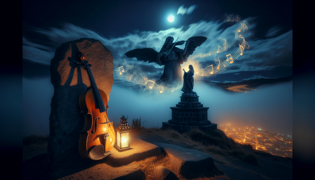
The specter emerged from shadow, her mantilla flowing like ink in water. She listened to each note, head tilted, lips parting in a ghostly smile. I played on, eyes closed, feeling the violin’s voice merge with her lament into something greater than either alone. The wind whipped around us, carrying the duet down into Quito’s sleeping barrios. The melody rose in crescendo, then settled into a hush, a single sustained note that vibrated deep in my chest.
I opened my eyes to find her standing before me, eyes glistening with tears of moonlight. She raised a hand in blessing, a gesture of acceptance and farewell. The violin’s string snapped—a sudden, discordant crack that cut through the night like a cry—yet in that fracture, I felt release. Her figure shimmered, dissolving into a spray of pale motes that drifted skyward.
Silence reclaimed the hill, broken only by the sound of my ragged breathing and the low hum of the city below. I closed the violin, its broken string swinging like a pendulum marking the passage of moments. The air tasted of salt and possibility, each breath a reminder that I remained alive to tell this tale.
As I descended into a world already waking to morning’s first light, I carried her melody in my veins. On windy evenings, I still hear that final note drifting through the air, a bridge between centuries. And if you climb El Panecillo when the moon is high and the city sleeps, listen closely: you may catch the echo of her song, calling you across the threshold between what was and what remains.
Conclusion
When dawn’s first light brushed the red-tiled roofs of Quito, I found the broken violin and accordion abandoned on the hilltop, instruments now silent but saturated with memory. The wind carried a final whisper of her melody down the slope, mingling with birdsong and the distant clang of market bells. I tucked the sheet music and the fractured string into my coat pocket, the fingerprints of history pressed into their fibers. Each day since, I walk beside bustling cafes and echoing churches, the specter’s song a quiet refrain beneath city noise.
Her voice lives in the way wind rustles linen curtains, in the tremor of a street musician’s refrain, in the hush before a church organ’s swell. I deliver her story to curious travelers, and when I do, I trace a finger along my collar where her breath once brushed my skin, cool as river stones. The Virgin’s statue still watches, a sentinel of stone and spirit, her gaze reflecting both compassion and admonition.
Sometimes, when the nights grow long and the moon weak, I climb El Panecillo alone, lantern in hand and heart open. I play a hesitant chord on a borrowed instrument, and if I’m fortunate, the accordion’s distant sigh returns, and I catch the ghostly shimmer of her mantilla. For a moment, past and present entwine once more, and I stand upon the threshold, neither living nor entirely gone.
In the heart of Quito, beneath angels carved from starlight, the Singing Specter endures. Her song is a bridge across time, a reminder that our histories are not buried but breathe in the wind, ready to be heard. So listen carefully when you wander El Panecillo after dusk—let your senses drink in the night air’s chill, the scent of rain-soaked stone, the echo of accordion reeds. You may discover a melody older than the city itself, a voice that sings of love, loss, and the enduring power of memory. And you’ll know, in your bones, that some stories never fade—they simply wait for someone brave enough to lend an ear.
